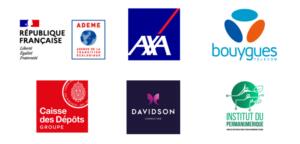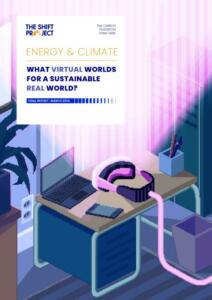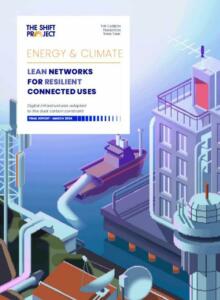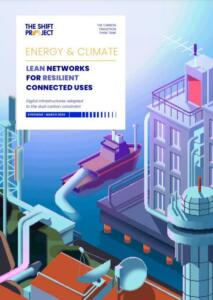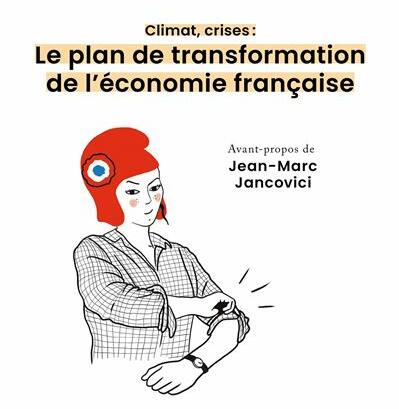The Shift Project’s Digital team is pleased to announce the publication of two new reports on digital sufficiency!
These new reports are a continuation of our work on the subject since 2018 (see our Digital sufficiency page).
You can now download :
- The final report Energy, climate: What virtual worlds for a sustainable real world? (56p.)
- The final report Energy, climate: Lean networks for resilient connected uses (80p.)
- The summary of the report on Virtual Worlds (6p.)
- The summary of the Mobile Networks report (6p.)
- Appendices to the Virtual Worlds report
- The Excel spreadsheet used for the Meta-metavers scenario
- The Excel spreadsheet used for the energy-carbon assessment of the Meta-metavers scenario
- The Excel spreadsheet used for the Metaconference case study
- The Excel spreadsheet of data from the Réseaux model modelling
- The Excel spreadsheet used to calculate the carbon footprint of satellite networks
For the first time, the Shift Project is looking at the carbon footprint of technologies that have yet to be widely adopted (virtual worlds, 6G, etc.). Positioned ahead of the phases of widespread deployment, these new reports offer benchmarks to guide innovation and technological choices in the digital sector in France.
New uses, future infrastructures: what are the possibilities for sustainable digital technology in the face of energy-climate constraints?
Digital technology, both a tool and a challenge for decarbonizing the economy
Digital technologies are not virtual tools but physical media: exchanging data is only possible thanks to terminals (smartphones, computers, tablets, etc.), network infrastructures (terrestrial and submarine cables, mobile network antennas, optical fibers, etc.), servers and data centers.
The digital industry’s carbon footprint, which is growing at an average rate of 6%/year, already accounts for 3% to 4% of global emissions today (The Shift Project, 2021). In France, it represents at least 2.5% of the national footprint (ADEME & Arcep, 2023). In a context of intense electrification of uses (mobility, buildings, industry, etc.), it is at the heart of planning and supply issues.
Like other sectors of the economy, it must meet its decarbonization target: -45% by 2030 compared with 2020 at global level (SBTi et al., 2020), which the Shift Project proposes to translate into a target of -30% by 2030 for the French case.
ENVIRONMENTAL IMPACTS OF VIRTUAL WORLDS
Are virtual worlds compatible with a low-carbon digital world? Under what conditions do these new promises of use constitute relevant technologies in view of energy-climate constraints?
We propose an approach based on 4 characteristics that define virtual worlds:
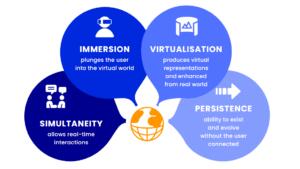
Our work has resulted in a tool that translates the service promises of virtual worlds into concrete implications for the digital system and its infrastructures. It enables us to rapidly link the solutions proposed today by the virtual worlds ecosystem to their energy-climate implications.
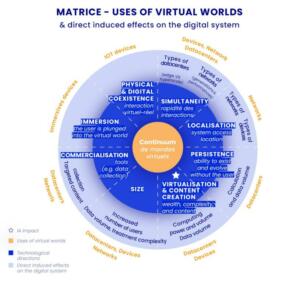
Undifferentiated deployment and widespread adoption of virtual world services are incompatible with a resilient trajectory for the digital system with regard to the dual carbon constraint. Ratifying the undifferentiated deployment of virtual worlds would have the effect of consolidating today’s unsustainable digital dynamics, placing it on an impact trajectory representing almost 7% of global carbon emissions in 2030, as close as possible to the most alarming scenario of those modeled by the Shift Project in 2021.
At French level, making this scenario possible would require technological deployments (latency, throughput, etc.) and capacities on the mobile network side that would multiply their carbon-energy impacts by 2. This would put digital technology on a trajectory whose impacts in 2030 are well above the ADEME-Arcep trend scenario (ADEME & Arcep, 2023), and whose narrative is only compatible with the ADEME “Pari réparateur” scenario to 2050 (ADEME, 2021).
The Shift Project makes four main sets of recommendations, available in the summary and report: measurement & transparency, optimization, collective reorganization towards sobriety, and training & skills.
ENVIRONMENTAL IMPACTS OF MOBILE NETWORKS
What impact do our deployment choices have on the carbon-energy impact of mobile networks? What uses motivate these deployment strategies? What strategies can be implemented to make them resilient to the dual carbon constraint?
The current dynamics of mobile networks are cyclical: deployment choices aim to adapt infrastructures to the expected evolution of digital uses (usage effect). Once the infrastructure has been deployed, usage develops according to new dynamics (supply effect) until it reaches new levels, calling for new capacities and new needs.
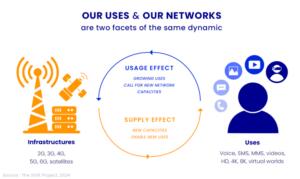
For a country like France, the undifferentiated deployment of highly intensive uses (virtual worlds, IoT, IIoT, AI, etc.) could lead to a 20% increase in the total carbon impact of the mobile network compared to the reference scenario, and an increase in its electricity consumption of over 4 TWh (i.e. a 2.5-fold increase) between 2020 and 2035. To steer the digital sector towards a resilient trajectory, mobile networks can play a major role by jointly activating the levers of “eco-design” and “sobriety”: extending lifespans, energy efficiency gains, modifying regulatory constraints, mutualization, designing a different 6G to serve decarbonization, controlling growth in usage.
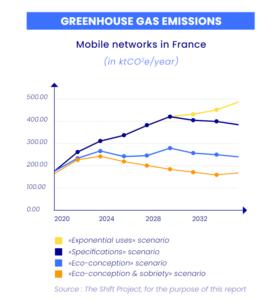
To steer the digital sector towards a resilient trajectory, mobile networks can play a major role by jointly activating the levers of “eco-design” and “sobriety “: extending lifespans, energy efficiency gains, modifying regulatory constraints, mutualization, designing a different 6G to serve decarbonization, controlling growth in usage.
The Shift Project makes four main sets of recommendations, available in the summary and report: measurement & transparency, optimization, collective reorganization towards sobriety, and training & skills.
CONTACTS
- Hugues Ferreboeuf, Digital Project Manager ferreboeuf@theshiftproject.org
- Maxime Efoui-Hess, Digital Program Coordinator | efoui@theshiftproject.org
- Marlène De Bank, Research Engineer | debank@theshiftproject.org
We would like to thank the working groups who are helping us to make progress on these issues.
PATRONAGE
Many thanks to our sponsors, who are working alongside us to promote sober, low-carbon digital technologies, and who are making it possible to publish this work. Many thanks to them!
